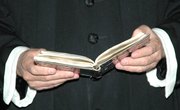
An ordained minister is a common law employee of a church for income tax purposes and is taxed on offerings, wages and fees for ministerial services. Thus, a minister may have to pay a self-employment tax one to four times per year, depending on the number of employees in his church. To receive tax exemptions, a minister must be responsible for a congregation, considered a leader by his respective denomination and conduct worship services.
Paying Self-Employment Tax
For tax purposes, a church generally considers its ordained minister as clergy. Consequently, a minister has a dual tax status, which means the Internal Revenue Service (IRS) considers them an employee for income tax purposes and a self-employed individual for Social Security purposes.
When a minister works for a church, the church can withhold income tax. The minister, however, must pay the Medicare and Social Security taxes herself in a self-employment quarterly tax payment or by asking their employer to withhold part of their income with an IRS W-4 form. Generally, a minister must pay self-employment taxes on the wages earned, their housing allowance and for the fair rental value of a property in which the minister may live.
Taxes on Offerings and Fees
When paying taxes on wages, a minister must include additional income he receives from plate offerings and fees charged to perform religious ceremonies, such as weddings, funerals and baptisms. However, if the offerings and fees are paid to the church, a minister does not have to pay taxes for them.
An additional tax consideration is for income a minister receives for religious work performed outside of his church. Even if a minister gives the church the money earned for performing work outside of the institution, they still must claim the earnings as income. Alternatively, the minister may receive a charitable contribution tax deduction for the funds they earned and gave to the church.
Social Security and Medicare Taxes
In certain circumstances, a minister may be exempt from paying Social Security and Medicare (SE) taxes if they elected to have Social Security coverage by submitting Form 2031 to the IRS for the 1986, 1987, 2000 or 2001 tax years or if they elected to have Social Security coverage for services as a minister before the year 1968.
To be exempt from the SE tax, a minister must oppose public insurance because of their religious denomination’s practices or for individual religious reasons, file an IRS Form 4361 for reasons other than those that are economical, inform his church of their public opposition to public insurance and their church must be part of a tax-exempt, established religious organization.
A minister can request SE tax exemption on his self-employment income as well as the income a tax-exempt employer provides. However, a minister is not exempt from paying SE tax if they receive any Social Security benefits unless they repay all the benefits given to them and file an IRS Form 4029.
Housing Allowance and Rental Value
While a minister generally has to pay taxes on housing allowances received or the fair rental value of a parsonage, they may be exempt from this tax if they trade the provisions for ministerial services, administrative duties or agreed upon circumstances. The exemption on housing allowances received or the fair rental value of a parsonage applies only to income taxes, not SE tax. For a housing allowance to be exempt, a church must designate the payment as such before issuing the funds.
References
- Clergy Tax Financial: Exemption from Social Security Taxes
- IRS: Form 4361
- IRS: Form 4029
- Internal Revenue Service. "Topic No. 417: Earnings for Clergy." Accessed Jan. 8, 2020.
- Internal Revenue Service. "2019 Publication 517: Social Security and Other Information for Members of the Clergy and Religious Workers," Page 3. Accessed Jan. 8, 2020.
- United States Government. "Internal Revenue Code, Title 26, Section 107," Page 452. Accessed Jan. 8, 2020.
- Internal Revenue Service. "Ministers' Compensation & Housing Allowance." Accessed Jan. 20, 2020.
- Internal Revenue Service. "2019 Publication 517: Social Security and Other Information for Members of the Clergy and Religious Workers," Page 9. Accessed Jan. 8, 2020.
Writer Bio
Flora Richards-Gustafson has been writing professionally since 2003. She creates copy for websites, marketing materials and printed publications. Richards-Gustafson specializes in SEO and writing about small-business strategies, health and beauty, interior design, emergency preparedness and education. Richards-Gustafson received a Bachelor of Arts from George Fox University in 2003 and was recognized by Cambridge's "Who's Who" in 2009 as a leading woman entrepreneur.

